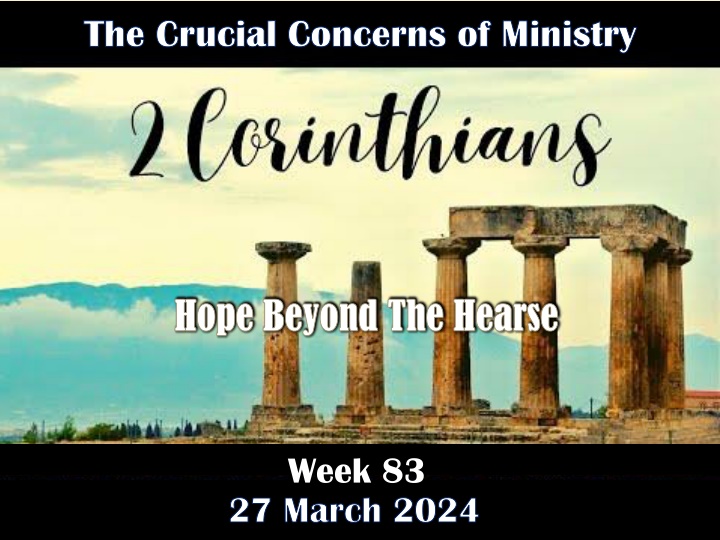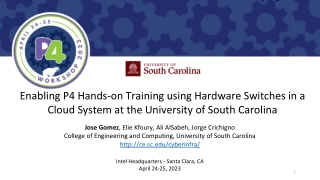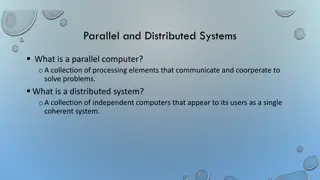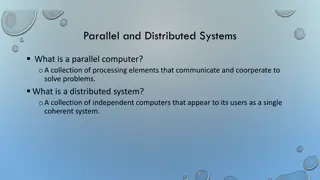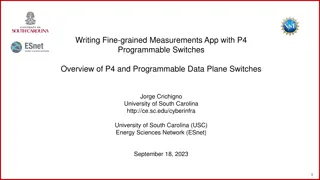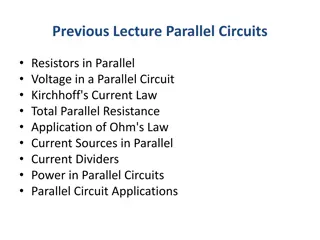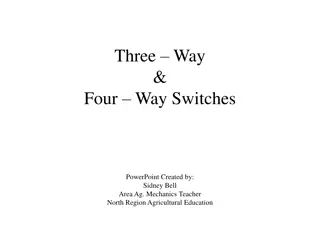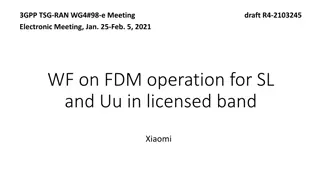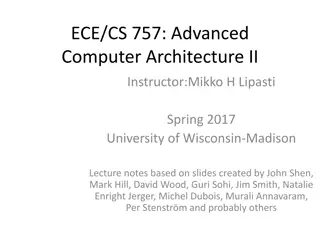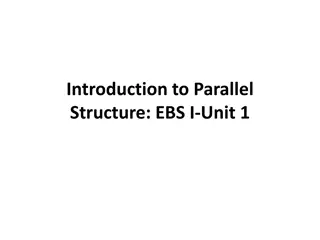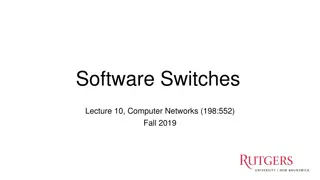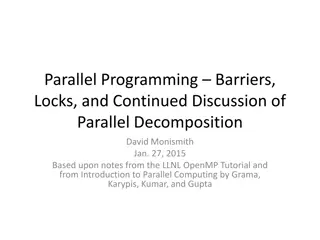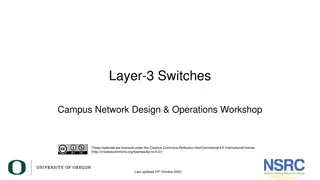TPS26600 Parallel Operation Power Switches
This content provides detailed information about the TPS26600 power switches, including schematics, test conditions, current sharing, overload response, short-circuit response, and fault indicators. Explore the features and performance of the TPS26600 in various test scenarios.
Download Presentation

Please find below an Image/Link to download the presentation.
The content on the website is provided AS IS for your information and personal use only. It may not be sold, licensed, or shared on other websites without obtaining consent from the author.If you encounter any issues during the download, it is possible that the publisher has removed the file from their server.
You are allowed to download the files provided on this website for personal or commercial use, subject to the condition that they are used lawfully. All files are the property of their respective owners.
The content on the website is provided AS IS for your information and personal use only. It may not be sold, licensed, or shared on other websites without obtaining consent from the author.
E N D
Presentation Transcript
The Crucial Concerns of Ministry The Crucial Concerns of Ministry Hope Beyond The Hearse Hope Beyond The Hearse Week 83 27 March 2024
2 CORINTHIANS INTRODUCTION As we continue our study in Second Corinthians, remember that the themes of this letter revolves around both the theological concepts and the practical aspects of Christian living. The primary issue at Corinth was the recognition of authentic ministry and submission to apostolic authority. Paul s corrective was to provide guidance and encouragement as the church navigates the challenges that continue to influence their unity, discipline, and spiritual growth. In our study, Paul addresses the existential and theological concerns of the Corinthians about life, death, faith, and accountability. Reminds them of the hope they have in Christ despite the challenges of life. He calls them to be confidence in God's promises, to prioritize pleasing God, and to expect fulfillment of their hope in the resurrection and eternal life.
2 CORINTHIANS - LESSON OVERVIEW Swindoll opens our study by reminding us of a sober reality that all will one day face. He says No matter what journey we take from here to there, we won t avoid it. No back road, no bypass, no alternate route can keep us from crossing its path. We can be driving from home to church, or from church to lunch or from lunch back home. Suddenly a police car pulls into the intersection in front of you, slows to a stop, lights flashing but no sirens. Another pulls up behind him and halts the flow of traffic. Another proceeds through the intersection. Then a long black hearse escorted by another police car proceeds through the intersection.
2 CORINTHIANS - LESSON OVERVIEW Behind it follows a limousine carrying a grieving family; behind them a long train of vehicles, headlights shining in the noonday sun, as members of that mournful parade head for the final resting place of a beloved family member, coworker, or friend. As they file through the intersection, an unprecedented patience falls over the growing traffic jam. We don t honk. We don t laugh. We don t groan. We watch in silence, knowing that one day all of us will be passengers at the head of a similar somber procession. People often say only two things are certain in life: death and taxes. While we may know people who have weaseled their way out of the latter . . .
2 CORINTHIANS - LESSON OVERVIEW But we know of nobody who has been able to cheat the former. Death is a certainty not a question of if, but when. In fact, from a pure philosophical perspective, death is more certain than birth. Humans have devised numerous ways to prevent conception and birth, but they have never been able to prevent aging and death. Not a single human being born into this world has escaped death apart from a miraculous divine intervention. Solomon tells us in Ecclesiastes, death is the great equalizer (Eccl. 2:14; 7:2). It doesn t matter if you re a saint or a sinner, rich or poor, male or female, healthy or sickly, happy or sad it is the same for all (Eccl. 9:2).
2 CORINTHIANS - LESSON OVERVIEW So what is the difference between the believer and the unbeliever? What benefit has the Christian over the non-Christian if death ends the lives of both? Is there no hope beyond the hearse?
2 CORINTHIANS 5:1-5 1For we know that if our earthly house, this tent, is destroyed, we have a building from God, a house not made with hands, eternal in the heavens. 2For in this we groan, earnestly desiring to be clothed with our habitation which is from heaven,3if indeed, having been clothed, we shall not be found naked. 4For we who are in this tent groan, being burdened, not because we want to be unclothed, but further clothed, that mortality may be swallowed up by life. 5Now He who has prepared us for this very thing is God, who also has given us the Spirit as a guarantee.
2 CORINTHIANS 5:1-5 When it comes to wrong ideas about what happens to us when we die, peddlers of falsehood take advantage of ignorance, uncertainty, fear, and disbelief. When people turn away from the sure knowledge revealed by God in Scripture, they become susceptible to all sorts of misconceptions. So Paul begins with an assertion that should instantly snare our attention: We know (5:1). When it comes to the question of existence, we aren t left guesting, wondering, pondering, interpreting, or theorizing. The important things are made clear in Scripture, for those who have the eyes of faith to see and believe them.
2 CORINTHIANS 5:1-5 For we know Isn t that comforting? When we face our own inevitable mortality or the loss of our loved ones, we can know with certainty what the future holds. himself was a tent-maker, who had worked for a time in Corinth making and selling tents (Acts 18:1-3). Here, Paul speaks of the earthly body as this tent. Paul (temporary tent ) with our future heavenly, immortal bodies (permanent building from God ). Now he compares our present earthly, mortal bodies that tents are no match for a strong brick home built on a sure foundation. If you have ever been on a camping trip you will agree
2 CORINTHIANS 5:1-5 Tents are temporary dwellings, they can be cold in the winter and hot in the summer time. They can sag, start to leak, their pegs come loose. Holes form, critters invite themselves in, and a strong wind can blow them away. Now! Look at the building image. Paul says, For we know that if the earthly tent which is our house is torn down, we have a building from God, a house not made with hands, eternal in the heavens (5:1). Here Paul refers to the marvelous transition from our present fallen bodies to our future glorified resurrected bodies. Reminding us that when the Lord returns, believers in Christ who had died in this life will be miraculously raised up in their restored, glorified bodies.
2 CORINTHIANS 5:1-5 And those who are still alive will experience a sudden transformation of their mortal bodies as they get caught up in the air to meet the Lord and the resurrected believer from every generation. In light of this expectation, Paul likens our present, corruptible bodies to a temporary tent in which we dwell. But our future, incorruptible resurrection bodies will be like a permanent building. Not constructed of perishable materials from this world, but conformed to the building code for heavenly existence untainted perfection, spiritual immortality, heavenly glory.
2 CORINTHIANS 5:1-5 Paul says we have (presence tense) a building from heaven, indicating the certainty with which he holds the truth of our bodily resurrection. The apostle John in 1 John 5:12-13, describes our salvation as a present reality, He who has the Son has life; he who does not have the Son of God does not have life. These things I have written to you who believe in the name of the Son of God, that you might know that you have eternal life. Paul, in 2Tim 4:8, expresses a similar thought, In the future there is laid up for me the crown of righteousness, which the Lord, the righteous Judge, will award to me on that day ; and not only to me, but also to all who have loved His appearing.
2 CORINTHIANS 5:1-5 From the perspective of a guaranteed promise of an eternal future, John describes eternal life as something we now possess; and Paul refers to the reward believers receive at the second coming of Christ as something presently laid up for him and all who look forward to His appearance. In this way, Paul can also speak of the heavenly, glorified, resurrection body as something that he has. Now, he expresses his longing for the transformation for his mortal, earthly body to his immortal heavenly body; Indeed in this house we groan, longing to be clothed with our dwelling for heaven (5:2).
2 CORINTHIANS 5:1-5 Similarly, in Romans 8:23, Paul says, We ourselves groan within ourselves, waiting eagerly for our adoption as sons, the redemption of our body. In both passages, Paul is saying that believers groan within themselves as they wait for the resurrection of the body. We groan because we are weary, rain-soaked campers longing for a permanent home (5:2). But we do not desire to be free from a shelter bodiless, ghost-like souls flittering about the heavens (5:3).
2 CORINTHIANS 5:1-5 The Christian s hope is not to be unclothed, but to clothed with a new immortal body (5:4). Many believe the Christian hope is simply dying so their souls may be free from their bodily existence. It s true the bible teaches that the soul will be separated from the body, for a stage, in the process of our ultimate redemption, but when we are absent from our bodies we are present with the Lord (5:8). However, the full realization of salvation is not to be naked but to be clothed in our new, immortal bodies at the Resurrection.
2 CORINTHIANS 5:1-5 So we await the fulfillment of this promise because we know with certainty that it will one day come to pass. Because God gave us His Holy Spirit as a pledge, a priceless deposit that guarantees what has been promised will come to pass(5:5). Though our present, earthly body is wasting away, we can count on a new, glorious body to replace it one day.
2 CORINTHIANS 5:6-10 6So we are always confident, knowing that while we are at home in the body we are absent from the Lord. 7For we walk by faith, not by sight. 8We are confident, yes, well pleased rather to be absent from the body and to be present with the Lord. 9Therefore we make it our aim, whether present or absent, to be well pleasing to Him. 10For we must all appear before the judgment seat of Christ, that each one may receive the things done in the body, according to what he has done, whether good or bad.
2 CORINTHIANS 5:6-10 Paul, along with most other first-century Christians, rightly expected that Jesus could have returned in his own lifetime. Nobody knows when the Lord will come back. His coming could literally be at any moment even today. This belief in the imminent return of Christ was just as true in the first century as it is in the twenty-first. Christ remains poised to step out of heaven as Judge and King as soon as the Father says Now! Because of this expectation, Paul speaks in terms of anticipation that his present earthly body would be swallowed up by life (5:4), as if he would be among those alive at the coming of the Lord and would experience, not death and resurrection, but transformation and rapture.
2 CORINTHIANS 5:6-10 Paul knew that many Christians had already died since the founding of the church at Pentecost, and that it was possible that he and others would also die before the Lord returned. So, in 5:6-10, Paul addresses twoquestions. What should we do while present in this mortal body, awaiting our future redemption? And, what will happen to us if our earthly bodies die before Christ returns? 1) The first question is rather easy to answer. While we dwell on this earth, we are to be of good courage (5:6, 8). We are to walk by faith, not by sight (5:7), and live in light of our future reward.
2 CORINTHIANS 5:6-10 In other words, we are to make the most of the time left to us on earth, knowing that whatever we invest in the current ministry of reconciliation will reap eternal benefits when Christ returns. Therefore, our ambition in this life is to be pleasing to Him in all we do (5:9). 2) To answer the second question, Paul says that to be at home in the body means to be absent from the Lord (5:6). Likewise, to be absent from the body means to be at home with the Lord (5:8). Paul expresses that same idea saying, But I am hard- pressed from both directions, having a desire to depart and be with Christ, for that is very much better; yet to remain on in the flesh is more necessary for your sake (Phil. 1:23-24).
2 CORINTHIANS 5:6-10 Yes, to be absent from this mortal body is to be present with the Lord, just as Jesus promised the thief on the cross, Truly I say to you, today you shall be with Me in Paradise (Luke 23:43). There is no hint of soul sleep, an unconscious hiatus before the resurrection in which we rest until Christ returns. Nor does a purgatorial cleansing in some intermediate state fit this passage. To depart this earthly life through physical death to be absent from the body means to be present with the Lord. Paul is not suggesting that this is the final experience of our resurrection. Those who die before Christ returns will be with Him, awaiting the time of His return to resurrect their bodies and rapture the church.
2 CORINTHIANS 5:6-10 The time when all of us will be rewarded for our faithful service in the glories of His kingdom (Matt. 19:28-29). In fact, it may be that when Paul says God will bring with Him those who have fallen asleep in Jesus (1Thes. 4:14), Paul is referring to Christ descending from heaven with the disembodies souls of the saints that had died prior to His second coming. These souls would be reunited with their resurrected, glorified bodies and caught up with the transformed living saints to meet the Lord in the air (1Thes. 4:16-17). Now, in Paul s description of what happens to believers when they die, he describes what will occur immediately after our resurrection and rapture: for we must all appear before the judgment seat of Christ (5:10).
2 CORINTHIANS 5:6-10 The Corinthian believers well understood the concept of a judgment seat. Years earlier, Paul himself had stood before the judgment seat of the Roman governor Gallio in Corinth, when hostile Jews accused him of violating their religious laws (Acts 18:12-17). The judgment seat of Christ, however, will be different. Christ will not judge believers to determine innocence or guilt. The judgment of not guilty was already rendered when God declared us righteous at our conversion because of the saving death of Christ (5:21), and because of the finished work of Christ received as our own by faith in Him.
2 CORINTHIANS 5:6-10 Our resurrection is guaranteed and our place in the kingdom of heaven is permanently assured (1:22; 5:5; Eph. 1:13-14). At the judgment seat of Christ, our future reward in the kingdom of God will be determined by the quality of our deeds and the motives behind them (1Cor. 3:10-15). Paul does not describe the divine compensation for our faithful service in the present ministry of reconciliation. He states only that the reward will be in proportion to the deed itself, whether good or bad (5:10). Some false teachers in Corinth may have been teaching a popular Greek philosophy that only the soul mattered, and that sins of the body were inconsequential.
2 CORINTHIANS 5:6-10 Therefore, some reasoned, because we are saved by grace and because only our spirits matter, we can get away with any kind of carnal behavior in our bodies. But Paul completely annihilates this reasoning. In the very bodies in which we served the Lord, we will also be rewarded before Christ s throne. And in the same body in which we sinned, we will lose rewards. Paul Barnett sums up Paul s message: The sure prospect of the judgment seat reminds the Corinthians and all believers that while we are righteous in Christ by faith alone, the faith that justifies is to be expressed by love and obedience and by pleasing the Lord. Our confidence that we will be with the Lord is to be held in tension with the fear of the Lord from which we serve Him.
2 CORINTHIANS 5:6-10 We must all appear before the judgment seat of Christ. There He will appraise our deeds and look deeper than our actions. He will see the motives behind them. He will look further than the quantity of our deeds to examine the quality. And on the basis of His perfect knowledge, He will grant rewards or withhold them. Our response to this truth? Whether we are at home in the body or absent, our number one ambition should be to be pleasing to Him (5:9).
APPLICATIONS OF THE LESSON Is It Well With Your Soul?
APPLICATION IS IT WELL WITH YOUR SOUL? Swindoll closes with these words from a very familiar and beloved hymn of the church And Lord haste the day when my faith shall be sight, The clouds be rolled back as a scroll; The trumpet shall resound, and the Lord shall descend, Even so it is well with my soul. In 1873, Horatio Spafford, a Chicago businessman, composed these lyrics following the tragic loss of his four daughters in a shipwreck. In the midst of this tragedy in his personal life, he was able to experience divine peace because, despite his loss, it was well with his soul.
APPLICATION IS IT WELL WITH YOUR SOUL? Not many people today have this underlying confidence in the condition of their souls before a righteous, holy God. Will it be well with your soul when the Lord descends as Judge and King? When God examines the thoughts, attitudes, motives, and deeds of our lives? Or will it turn out to be a disappointing discovery? Remember . . . we must all appear before the judgment seat of Christ, so that each one may be recompensed for his deeds in the body, according to what he has done, whether good or bad (5:10). Is that going to be a disappointing discovery, or will it be well with your soul? It s a probing thought, that s why the bible repeatedly urges us to give these questions serious consideration.
APPLICATION IS IT WELL WITH YOUR SOUL? Here are a few things to think about as we consider Hope Beyond the Hearse! FIRST When you die, where will you live again? Will it be with the Lord or away from His presence forever? Will it be well with your soul in eternity? Have you come to terms with your own guilt before God, confessed your desperate need for forgiveness, turned away from trusting in yourself to be good enough, and embraced Christ alone as your Savior? Only by grace alone through faith alone can you receive the free gift of reconciliation and eternal life. Then and only then will it be well with your soul. The choices are heaven or hell.
APPLICATION IS IT WELL WITH YOUR SOUL? No in-between. No nirvana. No purgatory. No second chance. No reincarnation. No holding tank while you decide. No nothingness. Will it be eternal bliss filled with joy and relief and the rewards awaiting God s people? Or eternal judgment, away from God and all those things you hold dear? Only you can determine which. SECOND If you are already a believer and have passed from the threat of eternal death to the irrevocable promise of eternal life, is it well with your soul in a temporal sense? That is, are you making the most of your opportunities in this temporary life?
APPLICATION IS IT WELL WITH YOUR SOUL? So that when you appear before the judgment seat of Christ to give an account of how you spent your days in service of the Savior, you will be honored rather than shamed. Though life is short, it is eternally significant. Have the incessant pressures and distractions of this world lured you away from those things that are most important? If it s already well with your soul, how well is it?
NEXT CLASS 03 April 2024 Before next class, read the below chapters in Before next class, read the below chapters in the KJV and in one other versions of the Bible, the KJV and in one other versions of the Bible, i.e., NIV, NRSV, TLB, CEV, etc i.e., NIV, NRSV, TLB, CEV, etc Chapter 5:11 21 Crazies For Christ
